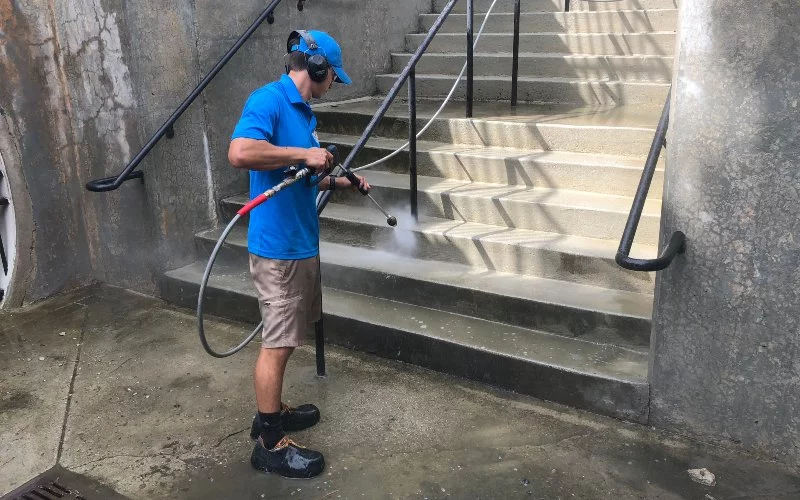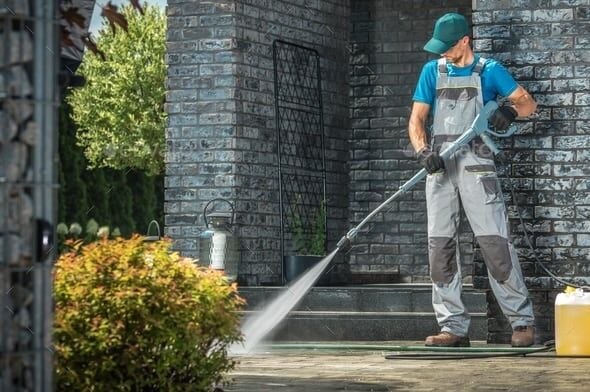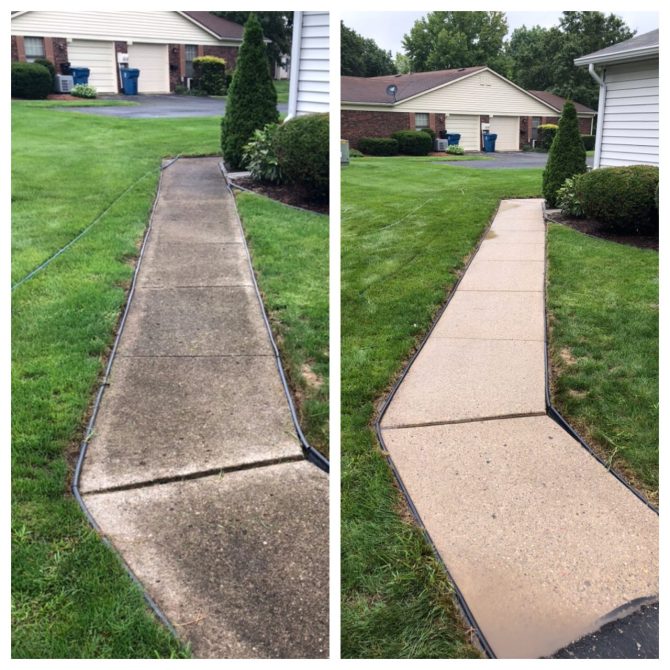Professional Euclid Commercial Washing for Exterior Surfaces and Buildings
Professional Euclid Commercial Washing for Exterior Surfaces and Buildings
Blog Article
Reliable Techniques for Graffiti Elimination That Bring Back Surfaces to Their Initial State
The obstacle of graffiti removal is multifaceted, requiring an understanding of numerous graffiti types and the most efficient strategies for restoration. From chemical remedies that cater to specific paint make-ups to press cleaning techniques that protect the integrity of surfaces, each strategy has its advantages.
Understanding Graffiti Kind
Understanding the diverse types of graffiti is essential for reliable removal approaches. Graffiti can be broadly categorized right into a number of kinds, each calling for different techniques for elimination. The most common kinds consist of murals, throw-ups, and tags. Tags are the simplest kind, including a stylized trademark or logo, often created swiftly with spray paint or markers. Their reasonably small size can make them much easier to remove however can still present obstacles depending upon the surface.
Throw-ups are more complex and commonly include bigger, bubble-like lettering loaded with a single shade. These pieces can cover a lot more area and might demand different removal techniques contrasted to tags. Murals, on the other hand, are detailed art work that can be rather large and detailed, typically commissioned or developed with permission. The elimination of murals provides special challenges due to the possibility for damage to the underlying surface area and the creative value.
Recognizing these distinctions is critical for choosing the right techniques and products for efficient graffiti removal. Each type not just varies in its aesthetic effect however likewise in the methods that will be most effective in recovering surfaces to their initial condition.
Chemical Elimination Methods
When taking on graffiti elimination, chemical techniques are commonly the most efficient and efficient strategy for different surfaces. These techniques use specialized solutions designed to damage down the chemical bonds in graffiti, making it less complicated to eliminate without harming the underlying product.

It is important to select a chemical eliminator that works with the surface area being treated to stop damage. Evaluating the product on a tiny, low-profile location before widespread application is a good idea. Furthermore, correct safety equipment, such as masks and handwear covers, should be used to ensure safety and security during the elimination procedure.
As soon as the graffiti has actually been liquified, it is critical to extensively wash the surface to get rid of any chemical deposit, which can lead to staining or deterioration in time (Graffiti Removal in Euclid). In general, chemical elimination approaches use an effective service for restoring surface areas to their original state while decreasing potential harm
Pressure Cleaning Techniques
While chemical elimination techniques are very effective, stress cleaning provides an alternative method for graffiti elimination that can be just as efficient, particularly on sturdy surfaces. This technique makes use of high-pressure water jets to dislodge and remove graffiti from numerous materials, such as concrete, block, and steel.
The performance of pressure cleaning rest on numerous factors, including the stress setup, nozzle kind, and the range from which the water is used. Usually, a stress series of 2,000 to 3,000 PSI is suggested for most surfaces, yet modifications may be needed relying on the substrate's level of sensitivity. Making use of a follower spray nozzle his comment is here can aid cover larger locations successfully while lessening the risk of damaging the underlying material.
Before pressure cleaning, it is important to evaluate the graffiti's composition. Water-based paints typically respond better to this approach than oil-based or long-term markers. In addition, pre-soaking the area with water can enhance the elimination procedure by minimizing paint attachment. After the pressure cleaning is full, surfaces need to be checked for any staying deposit, and a second pass might be needed to accomplish ideal results. On the whole, stress cleaning is a powerful tool in the graffiti elimination arsenal.

Eco-Friendly Solutions
Several individuals and companies are progressively looking for green options for graffiti removal, identifying the relevance of decreasing environmental influence. Traditional graffiti removal approaches typically involve severe chemicals that can be damaging to both the environment and public wellness. In contrast, environment-friendly options utilize safe and naturally degradable products that efficiently remove graffiti without creating damage to surface areas or releasing unsafe compounds right into the environment.
One reliable technique is using all-natural solvents, such as citrus-based cleaners, which harness the power of plant-derived components to break down paint without leaving Continue harmful deposits. Additionally, baking soda and vinegar combinations can act as gentle abrasives that lift graffiti while being risk-free for the environment.
One more ingenious technique is using green pressure washing systems that utilize less water and power contrasted to standard approaches. These systems frequently include specialized nozzles and eco-conscious detergents that enhance effectiveness while lowering waste.
Preventative Steps
Preventative steps play a vital function in combating graffiti criminal damage and minimizing its incident. By applying calculated strategies, homeowner and communities can prevent prospective culprits and reduce the costs associated with graffiti elimination.
One efficient approach is using anti-graffiti finishings, which produce a safety layer on surface areas, making it difficult for paint to stick. These finishes can be clear or tinted, permitting the initial aesthetic to remain intact while offering a safeguard versus vandalism. Furthermore, the setup of surveillance electronic cameras in high-risk areas can serve as a deterrent, as the presence of monitoring modern technology might prevent potential wrongdoers.
Community engagement is also essential; organizing area watch programs or graffiti clean-up events promotes a sense of ownership and pride among homeowners. Educational efforts in colleges can increase understanding concerning the negative influences of graffiti, advertising respect for public and private residential or commercial property.
Conclusion
In verdict, the efficient elimination of graffiti calls for a diverse strategy that considers the kind of graffiti and the surface area product. An extensive understanding of these techniques is important for achieving ideal results in graffiti elimination ventures.

Report this page